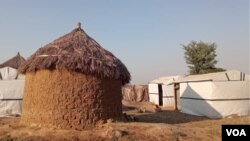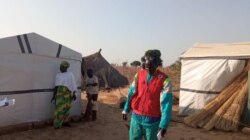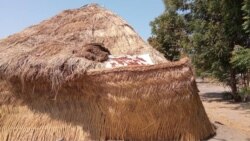Aid groups in Cameroon say thousands of people displaced last year from flooding and elephant attacks in the far north need help being resettled. Hundreds of the victims are living in the open after heavy rains and rampaging elephants destroyed their homes.
Heavy winds blow over Kai-Kai district on Cameroon’s northern border with Chad. The winds disrupt a ceremony in which 134 homeless civilians are receiving gifts from non-governmental organizations.
Alim Wendi, 26, a farmer and single mother of three, is among the people running for nearby tents to escape the dust, grass and tree branches blown about by the strong winds.
Wendi says after five difficult months, she has some basics like clothes, blankets and a mosquito net but that she still lacks some essentials.
Wendi says many villagers have also received planks to put up temporary houses, but that they lack nails and zinc to roof the houses they will build. Wendi says villagers who received the gifts have asked her to tell the Cameroonian Red Cross that they do not have food to eat.
Wendi is one of the 22,000 civilians along the Chadian border made homeless or displaced by floodwaters.
When the floods started in August, the government and aid groups said they had deployed humanitarian workers to help those in need. Wendi said they only received food aid and medicine for 30 days.
Bouba Daila is head of the Red Cross emergency response team in Mayo Danay, the administrative unit where Kai Kai is found.
He says they sent non-food items to the flood victims because their living conditions were so poor.
"They [civilians] were sleeping under the trees like animals. We bring [to] them mattresses, buckets and then we sensitize them, do not drink dirty water because there are so many diseases and then we sensitize them about COVID-19 also," he said.
Cameroonian officials said several hundred houses and farmlands were destroyed by the floods that stopped in November. Seasonal rains and waters from the nearby Lakes Chad and Maga often cause flooding in the area.
Officials also say that within the past six weeks, rampaging elephants have killed at least 10 people, destroyed plantations and left hundreds homeless on its border with Nigeria.
The government blamed civilians who moved into the elephants’ habitat for sparking the conflict.
Oumarou Golbo, 20, lost his cattle and farmland to both the floods and the elephants. Golbo says he, his wife and three children are currently living in a tent he built with grasses under a tree.
Golbo says he is still expecting the help the government promised.
He says not even a single villager has received assistance from the government and NGOs. He says villagers are exposed to a cholera attack because they drink dirty stream water. He says villagers are in urgent need of houses, food and water.
Hundreds of the flood victims and civilians displaced by the elephants have been lodged in schools. Teachers and students complain that it is difficult for them to share campuses with displaced civilians.
Midjiyawa Bakari, governor of Cameroon’s Far North region, said the government would come to their assistance soon but did not provide further details.






